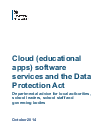Learning to survive in a world dominated by the internet should be as important for children as reading and writing, says a House of Lords report.
Lessons about online responsibilities, risks and acceptable behaviour should be mandatory in all UK schools, the Lords Communications Committee argues.
The internet is "hugely beneficial" but children need awareness of its hazards, said committee chairman Lord Best.
Industry leaders said education was key to keeping children safe online.
The Lords report builds on findings by the Children's Commissioner for Englandin January that the internet is not designed for children, despite them being the biggest users by age group.
"Children inhabit a world in which every aspect of their lives is mediated through technology: from health to education, from socialising to entertainment.
"Yet the recognition that children have different needs to those of adults has not yet been fully accepted in the online world," say the Lords.
Fake news
Lord Best added: "There is a lot of material which makes the internet harmful but it can also be hugely beneficial - a way for children to interact and find out about the world."
However, they need to cope with online pornography, internet grooming, sexting and body image issues, he said, as well as building resilience to the addictive properties of internet games which are "designed and developed to keep users online, missing out on sleep as they stay in their bedrooms glued to the screen".
Children also need to be aware of the dangers of fake news and covert advertising online, he added.
The report argues that "digital literacy should be the fourth pillar of a child's education alongside reading, writing and mathematics and be resourced and taught accordingly".
It should form the core of a new curriculum for personal social health and economic education, it adds.
It backs the government's move to make sex and relationships education statutory in England but says PSHE should also be mandatory in all schools, with the subject included in inspections.
The report notes "a worrying rise in unhappy and anxious children emerging alongside the upward trend of childhood internet use" and calls for more robust research into a "possible causal relationship" alongside immediate action to prevent children being affected.
Overall, the report says the internet should "do more to promote children's best interests" but found self regulation by industry was "failing" and that commercial interests "very often" took priority.
Meanwhile, it adds, government responsibility is "fragmented" with little co-ordinated policy and joined-up action.
Other recommendations include:
- Content control filters and privacy settings to be "on" by default for all customers
- All online businesses to respond quickly to requests by children to remove content
- A children's digital champion to be appointed to argue for their rights at the highest levels of government
- An industry summit, chaired by the prime minister, on redesigning the internet to serve children better
"This issue is of such critical importance for our children that the government, civil society and all those in the internet value chain must work together to improve the opportunities and support where the end user is a child," the Lords conclude.
The Internet Services Providers Association rejected calls for stronger regulation, while backing the report's call for better education.
James Blessing, who chairs the ISPA, said that the UK was regarded as a world leader in keeping children safe online "through a self-regulatory approach".
"We believe the most effective response is a joint approach based on education, raising awareness and technical tools," he said.
The government said it wanted to make the UK the safest place in the world for young people to go online.
"Ministers have begun work on a new internet safety strategy that will help make this a reality, and we will carefully consider the recommendations included in the Lords Communications Committee Report as part of this process," said a spokesman.


